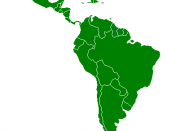Latin America in the nineteenth century was a time that was not well documented for the lower class. In fact, the only references to the culture of the lower class or "folk" were from oral history, poems, elite writings about the folk society, and from secondary sources. One source Poverty of Progress, by E. Bradford Burns, captures the ideals and thoughts of the folk culture in Latin America during the nineteenth century as well as the people's resistance to the "progressive" movement of the time.
Much of nineteenth century Latin American history is written as a struggle between the conservatives and liberals for political power. This is most likely a common thought because out of the sixty-three historians for this period only, one is female and all are wealthy, well educated, politically minded individuals. Burns, on the other hand, does not see Latin American history in this manner; he sees it as a struggle between the elite and the folk.
This struggle was most recognized in the resistance of modernization, Latin America being forced to become a "European," industrialized nation, by the folk in many different forms of protest. Their history and fight against the dominant elite is recorded in some literature of the time, but mostly through 'corridos.' 'Corridos' are very similar to town criers of colonial North America except that they would not only tell the news of the day or week but they would also pass down stories through songs, poems, and dances. All of which would tell a story of their history or culture that was significant.
In the nineteenth century, Latin America was run by the elite of the nation and the church who owned a good majority of the land. Leaders of the time felt that it was necessary for Latin America...



Great essay
I have read the bradford burns book and think that this essay does a good job of summarizing his chapter on the "Folk" of latin America. This just happens to be one of the only chapters in the book which I felt were worthy of remebering. Well done.
3 out of 3 people found this comment useful.